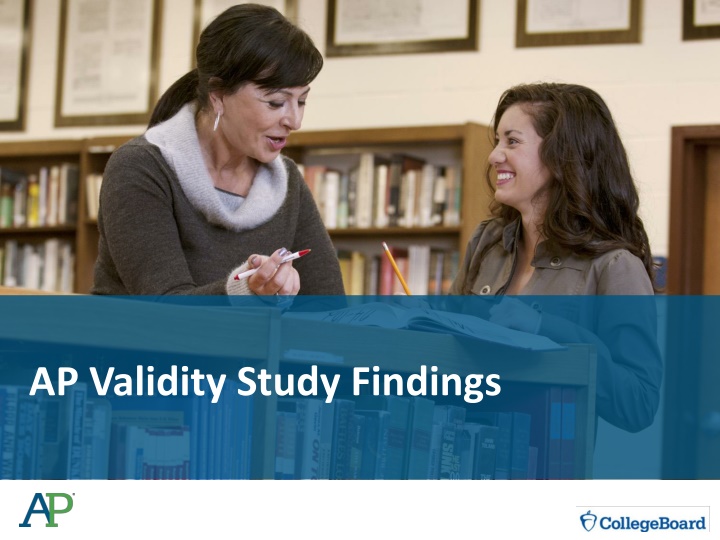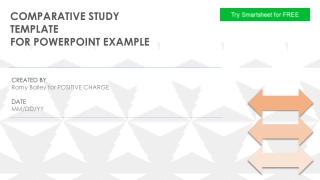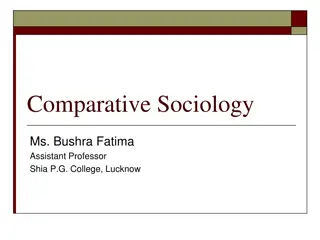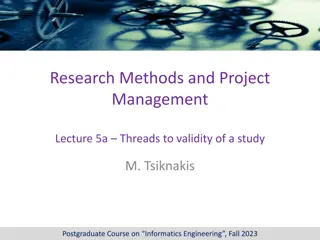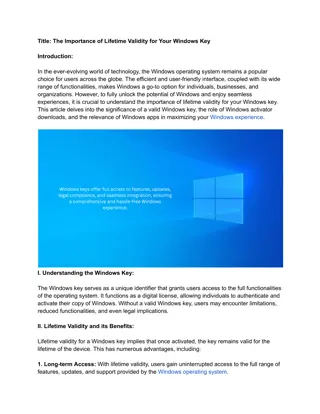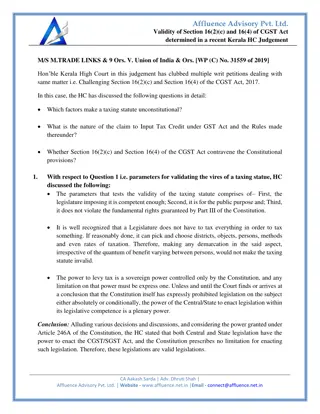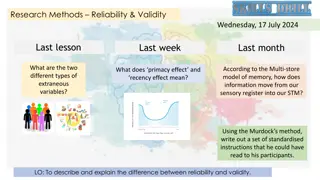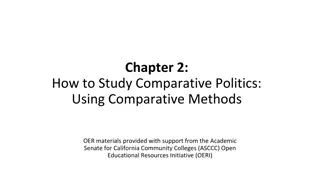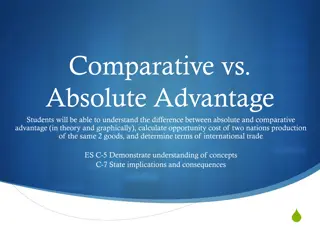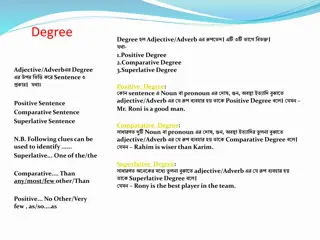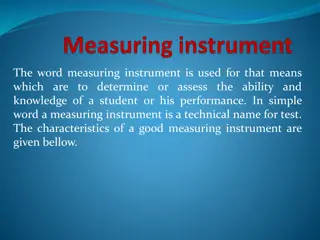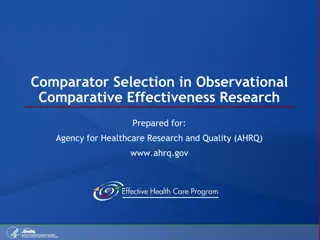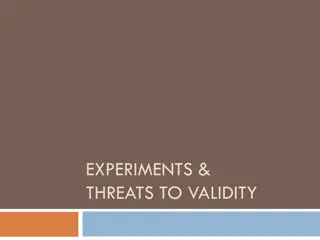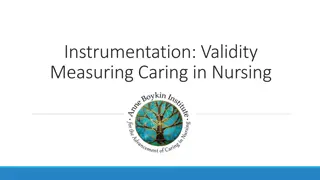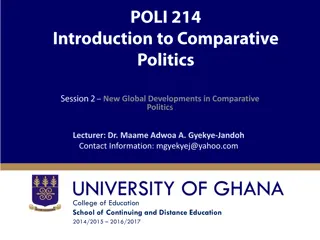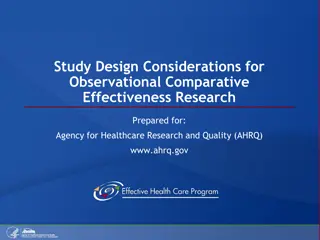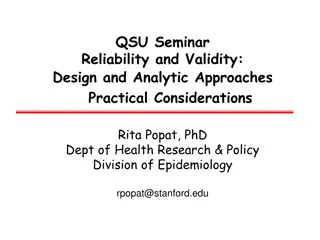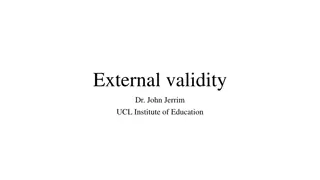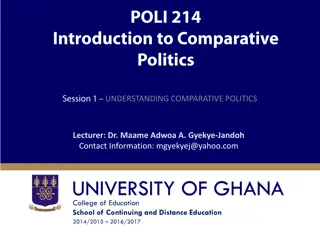Comparative Analysis of AP Validity Study Findings
This study delves into the results and implications of AP validity research findings across different institutions and years, focusing on AP exam scores, course performance comparisons, and English language and literature policies. The data presents insights on the impact of AP credits on subsequent course performance and academic achievements.
Download Presentation

Please find below an Image/Link to download the presentation.
The content on the website is provided AS IS for your information and personal use only. It may not be sold, licensed, or shared on other websites without obtaining consent from the author.If you encounter any issues during the download, it is possible that the publisher has removed the file from their server.
You are allowed to download the files provided on this website for personal or commercial use, subject to the condition that they are used lawfully. All files are the property of their respective owners.
The content on the website is provided AS IS for your information and personal use only. It may not be sold, licensed, or shared on other websites without obtaining consent from the author.
E N D
Presentation Transcript
Institutions & Years Abraham Baldwin Agricultural College Clayton State University Kennesaw State University University of Georgia Cohort: First-time entering students in Fall of 2013 tracked 2013-14 and 2014-15. 2
AP Exams ABAC CSU KSU UGA Biology Calculus AB Chemistry English Physics B Psychology Statistics US Government & Politics Due to the fluid nature of AP US History Exam credit policies, this subject was unable to be included. 3
Comparing Sequent Course Performance AP Exam Score Second Course Institution A Introductory Course Institution A 4
AP English Language & AP English Literature Policies at all four institutions: A score of 3 or 4 on either AP English Exam earns credit for ENGL 1101 A score of 5 on either AP English Exam earns credit for ENGL 1101 and 1102 Comparison to be made on ENGL 1102 course grades, comparing AP English Exam credit-holding students to students without AP English credit who took ENGL 1101 Students with AP English score of 5 are ignored because they have credit for ENGL 1102 5
Sequent Course Performance: ENGL 1102 AP Non-AP Pr > |t| N Mean (Std. Dev) N Mean (Std. Dev) ABAC 16 3.44 (0.73) 544 2.51 (1.20) 0.0001* CSU 15 2.87 (1.64) 396 2.94 (1.14) 0.8719 KSU 344 3.47 (0.83) 1,896 3.16 (0.93) <0.0001* UGA 1,440 3.51 (0.51) 857 3.28 (0.60) <0.0001* * Denotes statistical significance, p<0.05 Students with AP English credit for ENGL 1101 who went on to take ENGL 1102 performed as well as or better than students who did not have credit for ENGL 1101 and took it at the institution. 6
SequentCourse Performance: ENGL 1102 4.0 3.51 3.47 3.44 3.5 3.28 3.16 2.94 2.87 3.0 2.51 2.5 2.0 Non-AP AP (Score 3-4) 1.5 1.0 0.5 1896 344 16 396 15 857 1440 544 0.0 Abraham Baldwin Agricultural College Clayton State University Kennesaw State University University of Georgia 7
AP Calculus AB Credit and placement policies vary somewhat across institutions, as do numbering systems. Only UGA and KSU have at least 15 scores of 3 or higher on Calculus AB. Both institutions grant credit for MATH 1113 (Pre-calculus) for an AP Calculus AB Exam score of 3 or higher. Both institutions grant credit for Calculus I for an AP Calculus AB Exam score of 4 or higher. UGA: MATH 2250 KSU: MATH 1190 Students with an AP Calculus BC Exam score of 3 or higher were removed from analyses. 8
Comparing Sequent Course Performance: Calculus Calculus AB 3 Calculus AB 4-5 Pre-Calculus Calculus I Calculus II No AP creditAP credit 9
Sequent Course Performance: Calculus I Calculus I Mean Grade 4.0 3.34 3.5 3.22 3.0 2.66 2.51 2.5 Non-AP 2.0 AP Score of 3 1.5 1.0 0.5 286 261 32 170 0.0 University of Georgia - MATH 2250 Kennesaw State University - MATH 1190 10
Comparing Sequent Course Performance: Calculus Calculus AB 3 Calculus AB 4-5 Pre-Calculus Calculus I Calculus II No AP creditAP 3 AP 4-5 11
Sequent Course Performance: Calculus II Calculus II Mean Grade 4.0 3.5 3.11 2.89 3.0 2.79 2.5 Non-AP 2.0 AP 3 AP 4-5 1.5 1.0 0.5 48 54 165 0.0 University of Georgia - Math 2260 12
AP Biology Pre and Post Redesign Credit and placement policies vary somewhat across institutions. Only UGA has enough students. UGA s policy: AP Biology Exam score of 4 earns credit for BIOL 1107 and 1107-Lab, and a score of 5 earns credit for BIOL 1107 and 1107-Lab and BIOL 1108 and 1108-Lab. We investigated lecture and lab separately. 13
Sequent Course Performance: BIOL 1108/L BIOL 1108/L Mean Grades 4.0 3.54 3.47 3.5 2.88 3.0 2.76 2.5 Non-AP 2.0 AP Score of 4 1.5 1.0 0.5 351 122 308 117 0.0 BIOL 1108 BIOL 1108-Lab 14
AP Biology Redesigned Only Redesigned AP Biology Exam first administered May 2013. 15
Sequent Course Performance*: BIOL 1108/L *Redesigned AP Examinees only BIOL 1108/L Mean Grades 4.0 3.55 3.47 3.5 2.99 3.0 2.76 2.5 Non-AP 2.0 AP Score of 4 1.5 1.0 0.5 308 71 351 73 0.0 BIOL 1108 BIOL 1108-Lab 16
AP Chemistry Credit and placement policies vary across institutions, as do numbering systems. Only UGA has enough students. UGA s policy: AP Chemistry Exam score of 4 earns credit for CHEM 1211 and 1211-Lab, and a score of 5 earns credit for CHEM 1211 and 1211-Lab and CHEM 1212 and 1212-Lab. We investigated lecture and lab separately. 17
Sequent Course Performance: CHEM 1212/L CHEM 1212/L Mean Grades 4.0 3.55 3.48 3.5 3.25 3.0 2.75 2.5 2.0 Non-AP AP Score of 4 1.5 1.0 0.5 43 807 46 698 0.0 CHEM 1212 CHEM 1212-Lab 18
AP Physics B AP Physics credit and placement policies vary somewhat across institutions. Only UGA has enough students. UGA s policy: AP Physics B Exam score of 3 or 4 earns credit for PHYS 1111 and 1111-Lab, and a score of 5 earns credit for PHYS 1111 and 1111-Lab and PHYS 1112 and 1112-Lab. PHYS 1112-Lab does not have course grades associated with it at UGA, so it will not be explored here. 19
Sequent Course Performance: PHYS 1112 PHYS 1112 Mean Grades 4.0 3.69 3.5 3.01 3.0 2.5 Non-AP 2.0 AP Score of 3-4 1.5 1.0 0.5 33 51 0.0 PHYS 1112 20
AP Psychology At all four institutions, a student with an AP Psychology Exam score of 3 or higher is awarded credit for PSYC 1101. There are no prescribed sequent courses for Psychology. ABAC and CSU did not have enough students. KSU UGA PSYC 3305: Life Span Developmental PSYC 3230: Abnormal Psychology PSYC 3980: Research Design 21
Subsequent Course Performance: Psychology Subsequent Psychology Course Mean Grades 4.0 3.55 3.35 3.43 3.37 3.5 3.30 3.27 3.0 2.5 2.0 Non-AP AP Score of 3+ 1.5 1.0 0.5 176 174 96 112 226 66 0.0 University of Georgia - Psychology 3230 (Abnormal Psych) University of Georgia - Psychology 3980 (Research Design) Kennesaw State University - Psychology 3305 (Life Span Developmental) 22
AP Statistics Credit policies are similar across all four institutions, but course numbering and acronym systems differ. Only UGA had enough students. UGA s policy grants credit for STAT 2000 to students with an AP Statistics Exam score of 3 or higher. 23
Sequent Course Performance: STAT 4210 STAT 4210 Mean Grades 4.0 3.72 3.5 3.28 3.0 2.5 Non-AP 2.0 AP Score of 3+ 1.5 1.0 0.5 18 21 0.0 STAT 4210 24
AP U.S. Government & Politics Only UGA had enough students. UGA s policy grants credit for POLS 1101 to AP U.S. Government and Politics Exam scores of 3 or higher. Students then go into POLS 2000 (Introduction to Political Science). 25
Sequent Course Performance: POLS 2000 POLS 2000 Mean Grades 4.0 3.47 3.5 3.18 3.0 2.5 Non-AP 2.0 AP Score of 3+ 1.5 1.0 0.5 63 64 0.0 POLS 2000 26
Concluding Remarks Overall, students with AP Exam credit performed as well as or better than students without AP Exam credit who took the introductory course on the same campus as the subsequent/sequent course. The one exception is CHEM 1212-Lab, where AP credit-holding students underperform compared to non-AP. This was pre-redesign of the AP Chemistry Exam. In some cases, such as Calculus AB, the difference between groups is rather large, with findings consistent across multiple institutions. 27
Questions? College Board Researcher: Kelly Godfrey, Ph.D. Research Scientist, Higher Education Research kgodfrey@collegeboard.org 28
